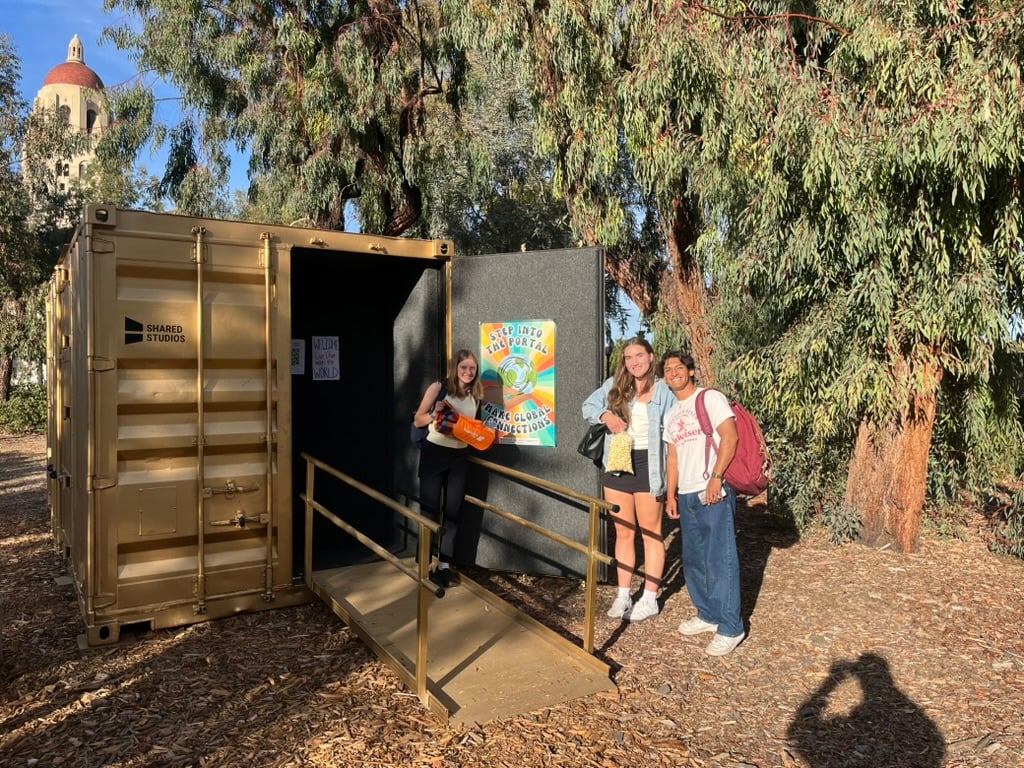Students and faculty called for attention to democracy globally at a variety of events on Democracy Day — a Stanford academic holiday that marked its third iteration this Tuesday and the first in which it coincided with a presidential election.
Events throughout the day, such as “Portal & Piazza” in Meyer Green and “Elections in Europe and the Rise of the Far Right” in Encina Hall, expanded this Democracy Day’s focus past domestic borders. Other events throughout the day included an international security panel with the former Russian Ambassador Mike McFaul ’86 and Ukraine Ambassador Steven Pifer ’76 and a Bechtel International Luncheon with five Stanford researchers.
“Democracy is not an engineering problem. Democracy is a struggle. You have to fight for freedom. You have to fight for democracy,” McFaul said during the panel.
Portal & Piazza, a pilot project that began earlier this fall, took place in a golden storage container on Meyer Green, which serves as an immersive platform connecting Stanford’s community with other “portals” across the world. The project is organized and led by Director of Campus Engagement Jordan Gray, in partnership with SharedStudio.
“It’s all about making connections,” said LisaMarie Moroyoqui, the Office of Community Engagement manager.
Gray and the Office of Campus Engagement organized two other events dedicated to comparing civic engagement in the U.S. to Rwanda and Brazil. Through the virtual platform, students learned how the Rwandan holiday, Umuganda, has resulted in the country’s capital being the cleanest city in Africa, and how Brazil’s compulsory voting, electronic ballots and multi-party system impact the voting and political experience.
“I think for a lot of us, we’re just focused on issues in the U.S., and we don’t really have a broader expansion of what’s going on outside,” Moroyoqui said. “So it’s really nice to connect with folks and see how things are in your country versus how we run things in our country.”
Moroyqui said some students described their discussions in the portal as “transformative” and “eye-opening,” adding to the larger conversation being held surrounding civic engagement and the election on campus.
Another international-focused event, “Elections in Europe and the Rise of the Far Right,” centered around European elections and the rise of the far right in the continent in partnership with The Europe Center.
During the lecture from Christophe Crombez Ph.D. ’94, a senior research scholar at The Europe Center, he warned about the rise of far-right beliefs in Belgium and Europe elections and how data and the media portray it.
Andra Jatikusumo MBA ’26 said the talk helped him understand how other countries’ elections work and parallels between them
“Europe, contextually speaking, has been […] allied to the United States. So, having a discussion about European Parliamentary elections and components is very relevant to the current setting in the U.S., where the U.S. is also going through an elections period, both on the presidential side but also on the Congress and Senate,” he said.
Similarly, Egan Tardif ’26 took the event as an opportunity to learn new things and see the ideological parallels between the US and European democracies. As a result, he said he found it interesting how “elections put it all back together, but people talk about just the differences.”
Helen Katz contributed reporting.
